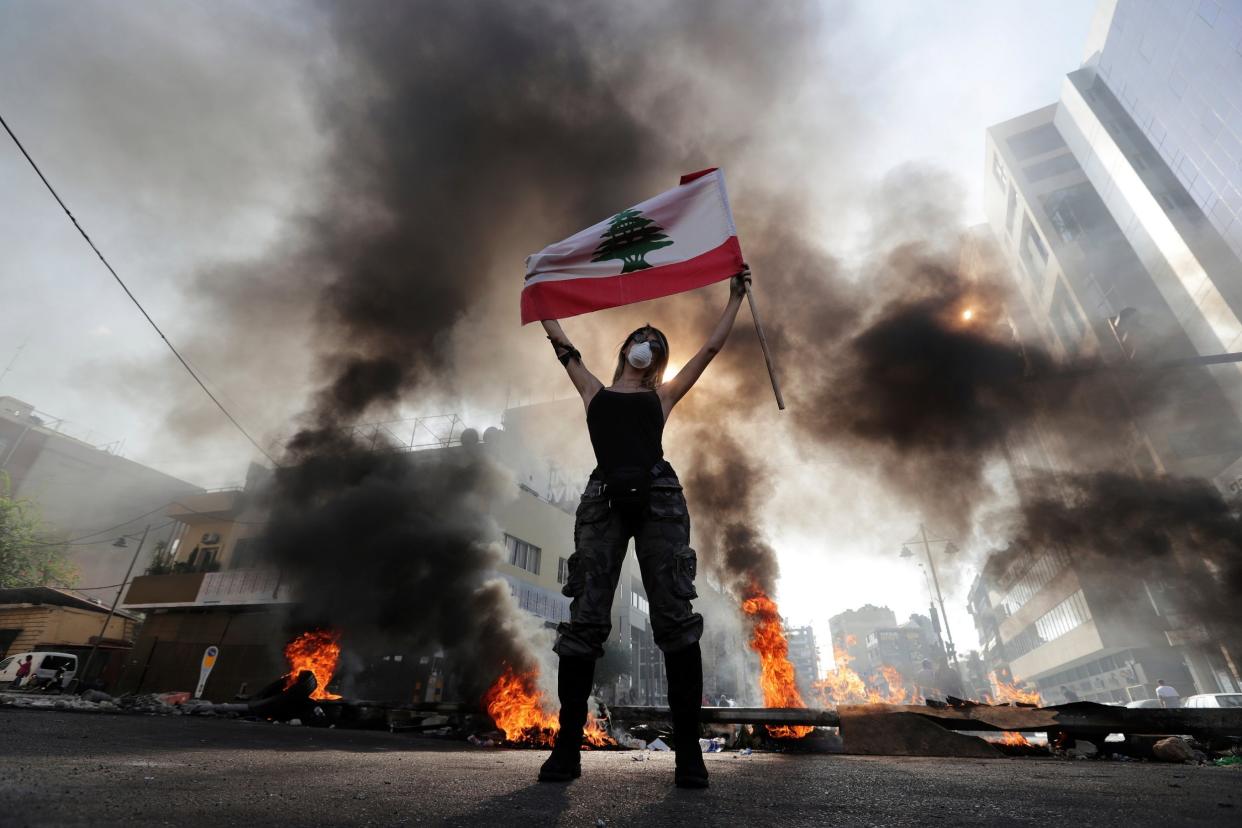‘We won’t back down’: Anger mounts in Lebanon after protester shot dead and president tells anyone unhappy to leave country

Demonstrators burnt tyres and barricaded main roads across Lebanon on Wednesday, incensed by the news that a soldier had killed a protester in what is the first casualty of the weeks-long civil disobedience.
Protesters were also marching on the presidential palace, outraged at President Michel Aoun's call for those taking part in the rallies to emigrate, else risk plunging the country into “catastrophe”.
The country has been gripped by 28 days of protests with tens of thousands taking to the streets to voice their anger at perceived government corruption, inefficiency and the worst economic crisis since the 15-year civil war in 1990.
Banks and schools remained closed for a second straight day. They have been shut for much of the four weeks since the start of the protests.
Alaa Abou Fakher, a local official and supporter of the Progressive Socialist Party (PSP), was shot on Tuesday evening in Khalde, south of Beirut, when soldiers tried to disperse protesters blocking the road.
The soldier has been arrested and the army said it was launching an investigation. PSP leader Walid Joumblatt, however, urged his supporters to remain calm as he visited the hospital where Abou Fakher had been taken.
Tributes have been pouring out on social media to the father of three, described as a “martyr of the revolution”.
In Tripoli, which has been home to some of the largest rallies, a mural was painted in commemoration.
“He is Lebanon’s martyr ... his blood is the responsibility of everyone occupying a post from the president on down,” one demonstrator in Khalde told Reuters news agency.
“Today, here, it is civil disobedience.”
طرابلس رسمت علاء تأكيداً على انو دمنا واحد.#لبنان_ينتفض #علاء_فخر_الثورة #لبنان_يثور pic.twitter.com/NmlcZbU8QX
— mɑɩɑk (@BulletProof_MK)
“We won’t back down at all, especially since we are facing authorities who don’t see and don’t hear,” said 50-year-old protester, Atef, in the southern city of Sidon.
The shooting is likely to worsen an already tense stand-off between protesters and the sectarian leaders that dominate the government.
In a televised interview on Tuesday evening, Mr Aoun said that “if people aren’t satisfied with any of the decent leaders let them emigrate”.
“We are working day and night to get the situation in order. If you continue in this way, you will strike Lebanon and your interests ... If they keep going, there is a catastrophe”, he said.
Mr Aoun also suggested there was no breakthrough in talks over forming a new government to replace former Prime Minister Saad al-Hariri’s coalition cabinet.
Mr Hariri resigned on 29 October, and was, according to Mr Aoun, hesitant about being prime minister again.
Protesters said Mr Aoun’s comments showed leaders were out of touch, stepping up demands that he also stand down.
“It is as if they are detached from reality, as if the people have no opinion, no voice,” Marwan al-Amine, one of dozens of protesters gathering near the presidential palace, told Reuters.
“The reaction (to Aoun) was very spontaneous” said another protester, Joelle Petrakian.
“People felt we have to ramp up the pressure ... We will not stop.”
Read more
In Lebanon, a woman’s place is leading the revolution
In pictures: The fire and the fury of Lebanon’s nationwide protests
Soldier breaks down in tears during standoff with Lebanese protesters
The Lebanese protests bridge social divides against the corrupt elite
How Lebanon’s spontaneous protests led to calls for revolution

